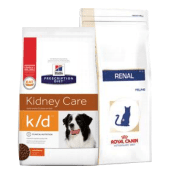Kidney Disease
(Acute)The kidneys primarily function to filter out toxins from the body, reabsorb water and concentrate the urine. In acute renal disease, the kidneys loose this ability and your pet rapidly dehydrates and toxins in the blood stream build up. These toxins further depress appetite and water consumption, which further dehydrates your pet and decreases nutrient intake. Toxins can act on the central nervous system and lead to seizures, as well as producing metabolic dysfunction throughout the body.
Clinical signs are:
- Vomiting
- Not eating
- Dehydration
- Ulcers on the tongue, gums and lips
- Decreased urine production
- Painful over middle back region (kidney area)
- Kidneys may be swollen and painful on palpation
- Acute depression
In severe disease, urine production can be completely shut off. If the kidneys stop producing urine, this is a serious and life threatening sign.
Cause: Cause of acute renal failure can be due to multiple diseases that can be broken down into the following categories.
- Chemical / Toxin:
- Antifreeze
- Non-steroidal anti-inflammatory drugs (E.g. Aspirin, Rimadyl)
- Antibiotics:
- Antifungals:
- Chemotherapy drugs
- Heavy Metals (Lead, Mercury, Arsenic)
- Systemic Disease:
- Leptospirosis
- Immune Mediated Glomerular Nephritis
- Massive body infection (Sepsis)
- Hepatic Disease
- Heat Stroke
- Heart Disease
- Cancer
Diagnosis: As many different underlying diseases can cause acute renal failure, a full diagnostic workup may be recommended by your veterinarian.
- Complete Blood Count: To check for infection, and changes to red and white blood cells.
- Chemistry: To check function of the kidney and observe any other diseases affecting liver, pancreas, blood sugar, electrolytes.
- Urinalysis: To see if there are any abnormalities in the urine that may suggest underlying cause.
- Urine Culture: To culture a bacterial pathogen that could cause severe kidney infection.
- Ethylene Glycol Test: To test for the presence of Antifreeze in the body.
Treatment:
- Intravenous Fluids: intravenous fluid therapy flushes toxins from the body, rehydrates and animal, and improves their general well being.
- Anti-emetics: drugs that help to reduce vomiting can make your pet feel more comfortable and potentially enable them to eat.
- Acid neutralizers: decrease stomach acid which builds up secondary to kidney disease.
- Antibiotics: if an infection is suspected.
- Phosphate binders: oral medication allows the binding of oral phosphorus in the diet before it is absorbed by the body, thus decreasing the amount of work the kidneys do.
- Diet: Low protein diets, such as Hills Science Diet k/d or Royal Canin Renal help to decrease ingested proteins lessening the workload on the kidney. Prescription kidney food is specially formulated by veterinarians to help manage animals with kidney disease. Kidney disease may develop because of other diseases or changes in health, breed/hereditary tendencies and even nutritional factors. Signs of kidney disease don’t usually appear until more than two-thirds of kidney function is lost.
- Advanced Procedures: Treatments such as dopamine administration, peritoneal lavage and dialysis may be available in specialist and university settings. The necessity for these procedures suggests a grave prognosis.
Please contact us immediately if:
- Your pet continues to be depressed, weak and lethargic
- Your pet continues to vomit, have diarrhoea, is not eating.
- Your pet is not producing urine, becomes dehydrated or does not take in fluids.
- There is any change in your health of the animal.


